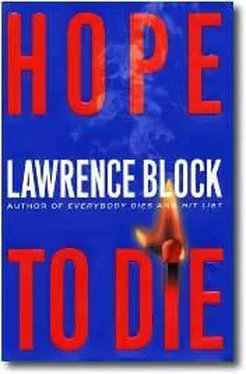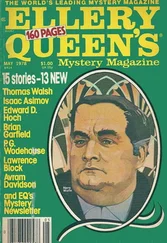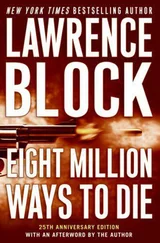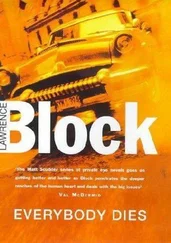"Not really. At this point all it is is a theory."
"Nobody saw a third guy on the scene in Manhattan."
"Not so far as I know. The trouble with a case that's closed- "
"Yeah, I know. There's things you would follow up otherwise. There was a guy visited Bierman a couple of times. Maybe it was the third man, the mysterious Mr. X."
"When was this?"
"Who knows? Bierman was pretty mysterious himself, far as his neighbors were concerned. Kept to himself, just went out to buy beer and pizza. Word is he had a guy who dropped in a couple of times, but nobody could say just when. We more or less assumed the guy was Ivanko."
"The description fit?"
"Description? 'Dude was wearin' a baseball cap. Or, hey, wait a minute, maybe he wasn't wearin' no baseball cap. Maybe it was some other dude was wearin' a cap.' "
"Maybe the third man gave them the gun."
"Hey, if it was his car, why shouldn't it be his gun, too?" He laughed. "I always more or less figured the gun was Ivanko's."
"Bierman didn't own one?"
"Not that anybody knew, but would they? My guess is it came from a burglary. That's the way most crooks get guns, especially small-time skells like these two. Some concerned citizen buys one for his protection, and there's a burglary, and that's the last he sees of it. Unless he's home at the time, the sad bastard, in which case the last he sees is it's pointed at him, and the last he hears is bang."
"A little Italian twenty-two," Schering said. "Pellegrino ten-shot automatic. I bet you thought they only made soda water."
"Diversification is everything."
"Isn't that the truth? Gun was registered to a psychiatrist at 242 Central Park West, reported stolen in a burglary back in March. Shrink and his wife were at the theater, came back to find the place tossed, some jewelry and valuables missing. Well, this is cute."
"What's that?"
"In the list of what's missing- 'two white linen pillowcases.' That tell you anything?"
"That the psychiatrist and his wife were lucky they didn't get home early."
"Sounds like Bierman and Ivanko, doesn't it? Pillowcases slung over their shoulders like they're on their way to do their laundry. Gun wasn't in the initial report."
"Oh?"
"Reported everything else, the jewelry, the pillowcases. Three days later he called back about the gun. It took him that long to think of it and remember the locked desk drawer he kept it in, and guess what? The drawer wasn't locked anymore, and the gun wasn't in it. Why keep a gun under lock and key?"
"For safety reasons, I guess."
"But why have it at all, if it's going to be that complicated to get to it? A locked drawer in his office."
"The office where he saw his patients?"
I heard him shuffling paper. "It doesn't say," he reported, "but it makes more sense that way, doesn't it? He's seeing patients all day long, and they're not coming to him to have their tonsils out. Some of them have got to be real nut jobs."
"That must be the technical term for it."
"He's got someone coming in that he's a little worried about, he takes out the key and unlocks the drawer. Any problem, he can get to the gun in a hurry."
"It must be comforting for the patient," I said, "to have a shrink who can pull a gun on you if you start acting out."
Schering laughed aloud. "You're on the verge of this major breakthrough," he said. "Really getting in touch with your anger, or remembering what really happened when your uncle came into your bedroom that night. And you look up from the couch, and there's Dr. Nadler, and he's pointing a gun at you."
Dr. Nadler wouldn't talk to me, and I couldn't really blame him. Doctor-patient confidentiality aside, what did I expect him to tell me? That he'd had Bierman or Ivanko as a patient, stretched out on his couch for an hour every Thursday, reliving childhood trauma and recounting dreams? That he knew who broke into his apartment and stole his gun, but hadn't seen fit to mention it to the police?
I put the phone down and decided it was just as well he'd brushed me off. If he'd welcomed me warmly I'd have had to think up some questions to ask him, and I wouldn't have known where to start.
I kept finding things out, but what I learned was barely worth knowing. That's not an uncommon feeling in an investigation. You knock on a thousand doors and ask ten thousand questions, and the scraps of information you amass just pile up until something fits with something else. You learn to keep going, and you try not to listen when a little voice says the whole enterprise is pointless.
But this time the voice was hard to ignore. I didn't see how I could keep working my way around the edges, picking at loose threads here and there. I knew what I had to do.
I reached for the phone, then changed my mind and left it where it was. Rain, the forecast had said, and the skies looked dark enough. I went outside, headed uptown, and decided I should have taken an umbrella. It felt like rain, all right.
Well, maybe it would clear the air.
The ground-floor antique shop looked to be open. The lights were on, the window gates drawn back. But I couldn't see anyone inside. The door was locked, and there was a button to push for entry. I pushed it, and after a moment a woman appeared at the rear of the shop and squinted at me, holding her hand to her brow as an eyeshade. She gave a little shrug, as if it didn't matter whether I was a customer or a holdup man, and buzzed me in.
Her stock ran to small rural landscapes in elaborately gilded frames, French bronzes, mostly of animals, Royal Doulton figurines, Art Deco lamps. One shelf of an étagère was given over to cameos.
She was a dumpling, her hair an unconvincing red, her cheeks heavily rouged, her billowy print dress flowing. Her smile was guarded, and something about her stance suggested she was keeping close to whatever device she could use to summon help.
I said I had a few questions about what had happened upstairs.
She said, "You're a cop?" and her face relaxed for a moment, then tightened. "You're not a cop," she said, with such certainty she had me convinced.
"I used to be," I said.
She nodded. "That I can believe. You look like you used to be, but not like you are now. I used to be a teenager. I used to be skinny. What do you want from me, Mr. Used to Be? I wasn't here, I don't know anything, and I already told the whole megillah twenty times."
"Not twenty times," I said.
"So maybe it was nineteen. What can you ask me that nobody asked me already?"
Nothing, as it turned out. I asked and she replied, and I can't say that either of us was enriched by the experience. After a few minutes of this she said, "My turn. Where did you come from?"
"Where did I come from?"
"You don't live in the building, so you came from someplace. I don't mean where were you born, I mean today. Where did you come from?"
"Fifty-seventh Street," I said.
"East? West? Where on Fifty-seventh Street?"
"Fifty-seventh and Ninth."
"What did you take, a cab? The bus?"
"I walked."
"You walked all the way from Fifty-seventh Street and Ninth Avenue to ask me these questions?"
"It's not that far."
"It's not next door. And you didn't call first. What if I didn't come in today? What if I got a headache and went home early?"
"Then I'd have missed this wonderful conversation."
She grinned, but she was not to be sidetracked. "You didn't come all this way," she said, "just to waste your time talking to me."
"Maybe I'm not the only one here who used to be a cop."
"I raised four boys. They wouldn't dare lie to me, but sometimes they would leave something out." She glanced toward the ceiling. "You talk to her yet?"
"No."
"And the longer you spend talking to me, the longer it is before you have to go talk to her."
Читать дальше












